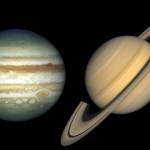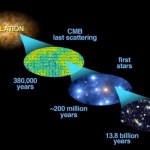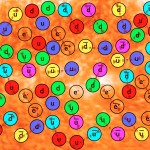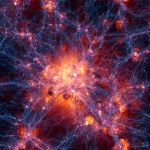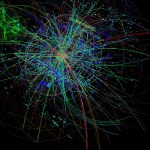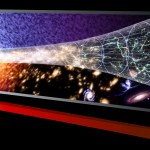Physics
"Most of these experiments required the reduction of the cosmic ray muon flux in order to be successful, and the group necessarily became expert in the operation of deep underground laboratories." -Frederick Reines
High-energy particles from space, generated from stars, white dwarfs, neutron stars, black holes, active galaxies and more, can far exceed the energies achievable by accelerators like the LHC. Even if you take into account the severe difference in available energy for producing new particles, cosmic rays still have the edge. But because there are so many interactions for them to…
“A thing may be of deeper impossibility than another, in the sense that you can be more deeply underwater--but whether you are five feet or five fathoms from the surface you are still all wet.” -Brian McGreevy
With everything going on in the world, it's always a wonderful reminder that here at Starts With A Bang! we're eternally focused on the cosmic story of what we know and how we know it. Regardless of what direction you want to push society, increasing our knowledge and understanding ought to be one thing we all agree on. This past week, here's a look back at what we've covered…
"It is old age, rather than death, that is to be contrasted with life. Old age is life's parody, whereas death transforms life into a destiny: in a way it preserves it by giving it the absolute dimension. Death does away with time." -Simone de Beauvoir
If you want to describe your location here on Earth, only two values are usually sufficient: one for your latitude and one for your longitude. This is because the surface of the Earth is two dimensional, and you’re generally not either underground or airborne; if you are, a third value, representing your altitude, is also necessary.
On the…
"I just think too many nice things have happened in string theory for it to be all wrong. Humans do not understand it very well, but I just don't believe there is a big cosmic conspiracy that created this incredible thing that has nothing to do with the real world." -Edward Witten
You don't have to be a fan of string theory to understand why it's such a promising area of scientific research. One of the holy grails of physics is for a quantum theory of gravitation: that describes gravity on the same footing as the other three forces, in very strong fields and at very tiny distances.…
"The law of the conservation of momentum is the basis of the static thrust equation, the law of the conservation of energy is the basis of the dynamic thrust equation. Provided these two fundamental laws of physics are satisfied, there is no reason why the forces inside the resonator should sum to zero." -Roger Shawyer, clearly misunderstanding the theory of forces
So it’s official: the NASA Eagleworks test of the EMdrive, an engine that claims to produce thrust with no reaction to correspond to its action, has passed peer review and is now published. If there’s truly no reaction at all, then…
“As far as the laws of mathematics refer to reality, they are not certain; and as far as they are certain, they do not refer to reality.” -Albert Einstein
If you create an entangled pair of particles, and stretch them apart as far as you want, the entanglement remains. If you make a measurement of one particle’s quantum state, you immediately -- and this is truly instantaneous -- learn the quantum state of the other. This is true whether the other particle is meters, kilometers, astronomical units or light years away.
Schematic of the third Aspect experiment testing quantum non-locality.…
"We are actually living in a million parallel realities every single minute." -Marina Abramovic
Ever since quantum mechanics first came along, we’ve recognized how tenuous our perception of reality is, and how — in many ways — what we perceive is just a very small subset of what’s going on at the quantum level in our Universe. Then, along came cosmic inflation, teaching us that our observable Universe is just a tiny, tiny fraction of the matter-and-radiation filled space out there.
The observable Universe might be 46 billion light years in all directions from our point of view, but…
“If you want your boomerang to come back, first you've got to throw it.” -Steven Hall
If you take all the matter out of the Universe, all you’d have left to warm you would be the radiation from the Big Bang’s leftover glow: the cosmic microwave background. At just 2.7º C above absolute zero, there’s no way of escaping this omnidirectional heat bath, as weak and ineffectual as it might be. Yet right here in our own galaxy, we’ve got an example of something even colder: the Boomerang Nebula.
A millimeter-wavelength view of the Boomerang Nebula. Image credit: NRAO/AUI/NSF/NASA/STScI/JPL-Caltech…
I'm teaching introductory mechanics for the umpteenth time, using the Matter and Interactions curriculum, as we have for a while. This is going to be my last time teaching out of M&I, though, because last year the department decided to switch to a different book. Starting this winter term, we'll be using Halliday, Resnick and Walker.
My physics blogging over at Forbes tends toward the contemplative anyway, for a variety of reasons, but knowing that this is the last time through M&I has had me thinking even more along those lines. Thus, recent posts on really simple physics and what it…
"The whole edifice of modern physics is built up on the fundamental hypothesis of the atomic or molecular constitution of matter." -C. V. Raman
As far as humans have figured out, there are four fundamental forces in the Universe: the three of the Standard Model (electromagnetism, the weak and strong nuclear forces) and General Relativity, our theory of gravitation. It’s the great hope of many that a quantum theory of gravitation will someday emerge, and that all four forces could be unified into a single framework. Among others, this is the dream of string theory.
The four forces (or…
"To raise new questions, new possibilities, to regard old problems from a new angle, requires creative imagination and marks real advance in science." -Albert Einstein
When we first began looking for exoplanets, we were expecting that other solar systems would be like ours: with inner, small, rocky worlds and outer, large gas giants. What we found surprised us in a couple of ways. Not only could planets of any size appear anywhere, as they seem to, but the most common mass for a planet was somewhere between two and ten Earth masses, something we don’t have a single example of in our Solar…
"Two things are infinite, the universe and human stupidity, and I am not yet completely sure about the universe." -Frederick S. Perls, quoting Einstein
The Universe we can see and access is certainly a big place. We see that it goes on for 46 billion light years in all directions, full of stars, galaxies, matter and radiation wherever we look, consistent with an origin in a hot Big Bang. But beyond what we can see, there ought to be more Universe just like our own, originating from either the same Big Bang, or possibly, if inflation is correct, from other Big Bangs at later or earlier times…
"The Universe is very, very big. It also loves a paradox. For example, it has some extremely strict rules.
Rule number one: Nothing lasts forever. Not you or your family or your house or your planet or the sun. It is an absolute rule. Therefore when someone says that their love will never die, it means that their love is not real, for everything that is real dies.
Rule number two: Everything lasts forever." -Craig Ferguson
When you think about the Standard Model of particle physics, you very likely think about all the matter, energy, particles, antiparticles, forces and interactions of the…
As the post title says, it's been a whole two months since the last time I did a round-up of my physics blog posts for Forbes. That's less content than you might think, though, because with the new academic term starting and some deadlines I had for other stuff, I posted basically nothing for most of September. October was a little busier, amounting to more than enough for a links post here:
-- How The History Of Measurement Shapes The Language Of Physics: While writing up some stuff about blackbody radiation, I ran up against the weird thing in optics where we default to talking about…
"Cosmology is the study of the origin, evolution, and fate of objects in the observable universe. [...] The key to the birth and evolution of such objects lies in the primordial ripples observed through light shining through from the early universe." -Wayne Hu
The Big Bang’s leftover glow -- the cosmic microwave background (CMB) -- is the great cosmic gift that keeps on giving. When it was first discovered in 1965, it validated the Big Bang and taught us that our Universe as-we-know-it had a birthday. When we measured that the CMB looked hotter in one direction and cooler in the opposite…
"Faced with the choice between changing one's mind and proving that there is no need to do so, almost everybody gets busy on the proof." -J. K. Galbraith
Last month, tensions between dark matter simulations and galactic rotation observations reached a new high. Despite all the successes of dark matter on the largest scales -- for the CMB, for large-scale structure, for gravitational lensing and for galaxy clusters, among others -- the simplest dark matter simulations reproduced unrealistic results for how individual galaxies ought to rotate. Moreover, a team of scientists uncovered a…
"Which is more likely? That the universe was designed just for us, or that we see the universe as having been designed just for us?" -Michael Shermer
One of the problems with the Standard Model of particle physics is known as the hierarchy problem. If you were to calculate the masses of the fundamental particles from first principles, you’d get something on the order of the only natural mass scale that nature provides: the Planck mass, at 10^19 GeV or so. With a lower mass value, the Higgs can account for the smallness of the other masses, but at just 125 GeV, there needs to be some…
"Do I believe, for example, that by using magic I could fly? No. How would you get around gravity? Impossible. Do I believe that I might be able to project my consciousness into a very, very vivid simulation of flying? Yeah. Yes, I've done that. Yes, that works." -Alan Moore
If you possessed a computer with enough power, you could conceivably simulate the entire Universe. From the inception of the Big Bang, you could compute the positions and momenta of every particle and every interaction over time, across all 13.8 billion years. If your simulation was good enough, you could even account for…
"Thus is our treaty written; thus is agreement made. Thought is the arrow of time; memory never fades. What was asked is given; the price is paid." -Robert Jordan
Why does time flow forwards and not backwards, in 100% of cases, if the laws of physics are completely time-symmetric? From Newton's laws to Einstein's relativity, from Maxwell's equations to the Schrödinger equation, the laws of physics don't have a preferred direction. Except, that is, for one: the second law of thermodynamics. Any closed system that we look at sees its entropy only increase, never decrease.
A system set up in…
"Each ray of light moves in the coordinate system 'at rest' with the definite, constant velocity V independent of whether this ray of light is emitted by a body at rest or a body in motion." -Albert Einstein, 1905
The idea of relativity, that there's no "absolute rest frame" where the laws of physics are special, has been around since Galileo. If you think about a moving train firing a cannonball, that's Galilean relativity: a person on the train would see the cannonball move at a different speed from a person on the ground.
A French 320 mm railway gun, used during World War I.
But if you…









